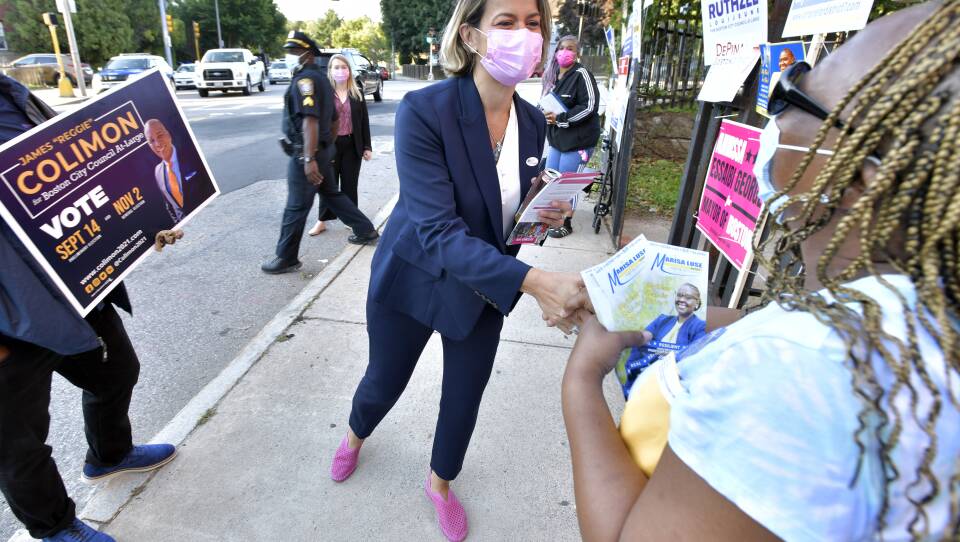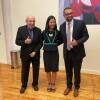Boston mayoral candidate Annissa Essaibi George, currently a city councilor, made clear the differences between her and fellow councilor and mayoral rival Michelle Wu in an appearance on Boston Public Radio Thursday, citing not only policy differences but leadership style.
Essaibi George called attention to her lifelong residency in Boston — Wu was born in Chicago but has lived in Boston since the mid-2000s and has served on the city council since 2014 — in addition to her years teaching at East Boston High School, and her status as a business owner in Dorchester.
"I also think that my leadership style is very different," she said. "I have a reputation across our city of being very much engaged, and really sort of tied into the work of not just having conversations… Being present is a big part of it, but doing the work."
Host Jim Braude pressed Essaibi George to be more explicit in her critique of Wu, who has taken criticism previously for being idealistic in her progressive policy, but lacking community engagement.
"I don't see Michelle in our neighborhoods, in our city, the way I am present," she said. "I hear that from my city's — from our city's — residents. I hear that from community members. I hear that from civic leaders. I hear that as I knock the doors, that I am the first person that has ever knocked a door... I think that a mayor of Boston should be engaged in that way, and that is what I bring to the table in a very different way."
Braude asked if Essaibi George thought Wu would make a good mayor of Boston, to which she responded: “If I thought she’d be a good mayor, I wouldn’t be running for mayor."
On police reform
Essaibi George has stated that she would like to hire more police officers, even as many candidates campaigned on re-allocating funds from the police to other social services during the preliminary election. Wu previously told Boston Public Radio she supports more investment in public safety overall, but not before the department undergoes systemic reform.
Essaibi George said she is committed to enacting the recommendations put forward by Boston's police reform task force, whose own members stated concern for the lack of urgency by the city.
"We need to make sure [the task force is] still engaged in this work," Essaibi George said. "As mayor, I commit and have committed to implementing those recommendations. I've committed to and will as mayor continue to bring them together, certainly on an advisory basis as we've got so much work still left undone in that space."
Host Margery Eagan asked who Essaibi George believes should have final say over firing police officers: the police commissioner, or a union arbitrator.
"I absolutely believe that our commissioner should have authority in those decisions, but I also do believe in due process, so really articulating and understanding what that means is important, certainly that will come up in contract negotiations," she said.
When asked by Eagan to clarify if the police commissioner should have final say about firings, Essaibi George said "yes."
On the growing humanitarian and public health crisis at Melnea Cass Boulevard and Massachusetts Avenue
Like Michelle Wu, Essaibi George said addiction services need to be decentralized.
She has proposed a city-level board made up of individuals who are in long-term recovery or accessing harm reduction services, to review plans and resources related to substance abuse.
Essaibi George categorized the situation in the area as a "battlefield" that needs to be met with more urgency than city leaders have done so to date.
While she said she personally does not support safe injection sites, she said she's open to continuing conversations about it.
"I have not been a supporter of safe injection sites," she said, noting she visited some in Canada and Philadelphia.
"What I saw, when safe injection does work, you need lots and lots of facilities to make it happen," she said. "What is being discussed at the state level today, it is a pilot, it is one site, and the impact of one site I think is very little."
"This is an opportunity, certainly, to explore," she continued. "It's not something I'm supportive of, but we have to look at every opportunity... if this is a potential tool, let's talk about it."
On media coverage of the race
When asked whether she felt the media has treated her fairly in the race, Essaibi George said she did not.
"The media in many cases has just assumed my opponent is situated to win this race," she said. "There’s this assumption that [Wu]’s just going to simply win it because of some of the support she’s received and to make that assumption that the people of Boston have made their choice. And for the media to have made that assumption, I think, is underestimating my strength, underestimating my stamina, and my desire to really solve the problems that our city’s residents are facing day in and day out."







